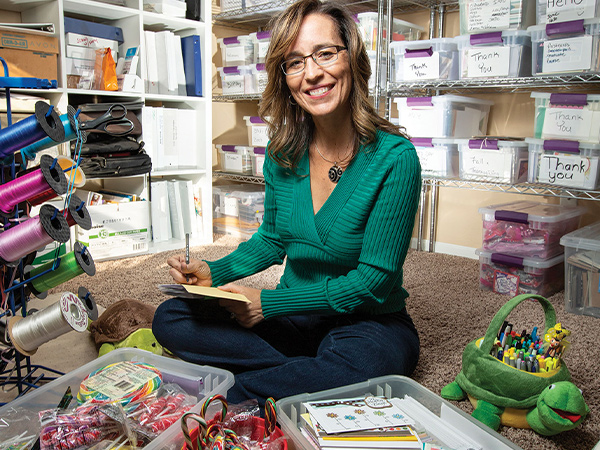Developing Cancer Therapies at the Intersection of Chemistry and Biology
Pioneering chemist and Fellow of the AACR Academy Carolyn R. Bertozzi, PhD, leads efforts to develop cancer therapeutics against “a different type of drug target.”
A well-manicured garden turning into an overgrown jungle.
That’s how Nobel Laureate Carolyn R. Bertozzi, PhD, FAACR, describes some of the changes that occur when a normal cell becomes malignant.
In this case, she’s referring to changes in certain sugar molecules called sialoglycans, which are found on normal cells but grow in number and become reorganized in cancer.
Dr. Bertozzi, a renowned biochemist at Stanford University, has been interested in these and other similar structures for many years. She developed a chemistry technique to study them in 2007, a groundbreaking development that led to her receiving the 2022 Nobel Prize in Chemistry. In 2023, Dr. Bertozzi was elected a Fellow of the AACR Academy and received the AACR Award for Outstanding Achievement in Chemistry in Cancer Research for this trailblazing research.
Today, her research focuses on developing cancer drugs that target sialoglycans on cancer cells. At the AACR Annual Meeting 2023, she explained how she and colleagues discovered that the overgrowth of sialoglycans on cancer cells helps cancers evade antitumor immune responses. To combat this evasive mechanism, they designed a molecule that essentially shaved the sialoglycans off the cancer cell surface.
“[Sialoglycans] are a very different type of therapeutic target from the conventional targets … and for a different type of drug target, you need a different type of modality,” she said.
“We had the idea of developing a therapeutic that would function essentially like a lawnmower, and we envisioned parking this lawnmower on the surface of the cancer cells and just letting it cut the sialoglycans off as if it were just mowing the grass.”
This therapeutic, E-602, was evaluated in 32 patients with advanced solid cancers in the GLIMMER-01 phase I/II trial. Preliminary trial results were reported at the AACR Annual Meeting 2023 by researcher Jason J. Luke, MD, from UPMC Hillman Cancer Center.
Dr. Luke shared that E-602 was tolerated by patients and boosted immune activation; some patients also experienced stable disease. Based on these results, additional clinical trials were initiated: a phase II trial to evaluate E-602 for non-small cell lung cancers or melanomas that did not respond to prior immunotherapy and a separate phase I trial to evaluate E-602 in combination with immunotherapy.
Other researchers are targeting glycans in cancer, too. Avery D. Posey Jr., PhD, an AACR NextGen Star and a researcher at the University of Pennsylvania, discussed his research at the 2022 AACR Special Conference on Pancreatic Cancer. There, he explained that changes to glycans on pancreatic cancer cells make the cancer more aggressive and more likely to spread. He and colleagues designed an immunotherapy that targeted altered glycans, an approach that is now being evaluated in patients with pancreatic cancer.
In addition, AACR Fellow Louis M. Staudt, MD, PhD, a researcher at the National Cancer Institute, recently showed that blocking glycosylation of the B-cell receptor turned off a cancer-driving pathway in lymphoma cells, thereby uncovering a potential therapeutic approach for this blood cancer. This work was published in the AACR journal Cancer Discovery last year.
“I’m really excited to watch this new intersection of glycan biology and cancer biology unfolding,” said Dr. Bertozzi. “This is very much now the millennium of the life sciences—powered by chemistry, powered by physics, powered by materials science, powered by data science … All of these sciences are converging on being able to understand the complexities of our own bodies, and that’s kind of the ultimate frontier.
“It’s a great time to be a scientist.”

